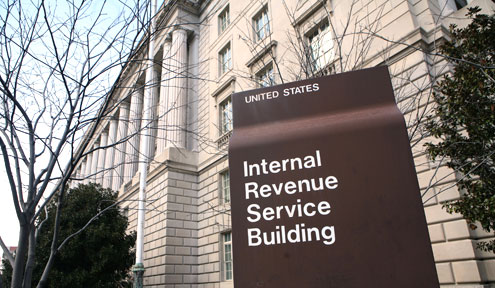Taxpayer advocate pleads for boost in IRS funding, hiring
Annual report cites increased workload due to code complexity and frequent changes by Congress.

Dennis Brack/Newscom
At a time when the Internal Revenue Service is offering buyouts to thousands of employees, the National Taxpayer Advocate is warning that "the imbalance between [the agency's] workload and its resources is becoming unmanageable."
In her office's annual report to Congress, Taxpayer Advocate Nina Olson cited increasing tax code complexity and frequent changes through legislation, saying, "It is up to Congress to ensure that the IRS continues to be effective, either by reducing the IRS' workload or by providing adequate funding to enable it to accomplish its assigned mission."
The report comes weeks after the IRS offered buyouts to 5,400 of its 95,000 employees and after Republicans in Congress succeeded in cutting the service's budget from the $12.1 billion President Obama requested in February 2011 to $11.8 billion for fiscal 2012, a reduction of 2.5 percent.
In addition to code complexity and fluidness, the increased workload is the result of the "need to provide service to an increasingly diverse taxpayer population, the IRS' increasing responsibility for administering economic and social policies, a surge in refund fraud and tax-related identity theft, and the implementation of new third-party information reporting requirements," the advocate said. "The IRS must explain each new provision to taxpayers, write computer code so it can process returns affected by the provision and train its auditors to identify improper claims."
But changes from Congress were the most quantifiable factor, among them the 2010 Affordable Care Act and various economic stimulus-related tax credits from the 2009 Recovery Act. "There were approximately 4,430 changes to the tax code from 2001 through 2010, an average of more than one a day, including an estimated 579 changes in 2010 alone," the report said.
One of the risks in IRS workforce overload, wrote Olson, whose office is an independent entity within IRS, is an inability to maintain a high rate of detection of fraudulent tax claims and identity theft, which is up 20 percent. "Each year," Olson wrote, "the IRS' task in identifying these claims has become more challenging, with the inevitable result that some fraudulent claims are never identified and many legitimate claims are mistakenly held up, imposing a significant burden on honest taxpayers."
Further evidence is visible in the agency's tottering ability to provide timely service to taxpayers over the telephone and in written correspondence. Between fiscal 2004 and 2011, the percentage of telephone calls the IRS answered from taxpayers seeking assistance dropped from 87 percent to 70 percent, the report said. During the same period, the IRS' ability to process taxpayer correspondence in a timely manner also declined. "Under pressure to do more with less," the report said, "we note that the IRS is in danger of implementing its enforcement and compliance initiatives in a manner that fails to provide taxpayers with adequate notice to enable them to understand what actions are being proposed and the basis for those actions."
In response to the report, Ways and Means Oversight Subcommittee Chairman Charles Boustany Jr., R-La., pointed to the overload as a reason to simplify the tax code. "Today's taxpayer advocate report provides a glimpse into the challenges facing taxpayers as they struggle with a broken tax code," he said in a statement.
"Nearly 50 pages of the report outline the different ways that the tax code has grown more complex and confusing over the years, reaffirming the need for comprehensive tax reform," Boustany added. "The Ways and Means Committee has taken an active role in laying the foundation for comprehensive reform, and as chairman of the Oversight Subcommittee, I intend to continue our IRS oversight activities to ensure limited resources are efficiently allocated, taxpayer rights are protected, and opportunities for fraud are reduced."
The National Treasury Employees Union sees the advocate's plea as a reason for boosting funding in an era of budget deficits. "NTEU has argued consistently that funding the IRS is not a cost, it is an investment that pays significant dividends for our country," President Colleen Kelley said. "That return on investment sharply underscores the reality that IRS employees are best-positioned and best-trained to do the revenue collection work of America," she said, adding that IRS collects 93 percent of total federal revenue, funding most government agencies.
"If you are one of those many thousands of individuals affected by identity theft," Kelley said, "you surely would want a trained IRS employee to help make this life-changing situation right."







